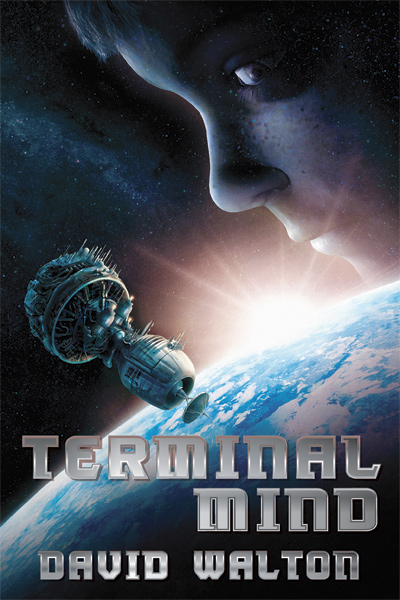SF author David Walton, whose novel Terminal Mind is a finalist for this year’s Philip K. Dick Award, told Tor.com that the book is about a boy who, aware of nothing outside of his virtual existence, is a slave to the man who sliced his mind into the computer network.
“When he is released into the worldwide computer network—an organic network integrated into the very brains of its citizens—his master wields tremendous power through him, able to see through the eyes of almost anyone he chooses and steal their secrets,” Walton said in an interview. “The result is a race between those who would use the child to dominate, and those who would see him destroyed… and the child’s mother, racing to find him, for whom both options are unthinkable.”
Terminal Mind takes place in Walton’s home town of Philadelphia, but a few small things have changed—such as the huge crater where Center City used to be. “The Hemisphere War against China and its allies has left the United States splintered into scattered city-states, Philadelphia among them,” Walton said. “Over time, the city has repaired itself, as new technology allows new miracles: buildings can be grown in hours, communication flashes through light beams, and flesh can be molded to the whims of its owners. These wonders are commonplace along the Crater Rim, where the rich play with new architecture and new body styles, but in the Combs, among the poor, the need for living space is so great that the buildings have grown into and over each other, forming a labyrinth of poverty and crime that few Rimmers dare to enter. It is this world that the enslaved child and his master begin to exploit, playing rich against poor in a bid for domination.”
Science fiction authors have been writing for years about uploading human minds, but Terminal Mind grew out of the notion that that technology might fail. “In my day job, I’m the technical lead for a research lab doing Top Secret work for the U.S. government,” Walton said. “I see a lot of technology that doesn’t work, certainly not at first. So what do you think would happen if somebody took a laser scalpel and cut your frozen brain into thin slices like a deli cheese? Would you like to be the first? I don’t think so.”
“Let’s say the laser ablation goes off like clockwork, and I find myself, fully conscious, in a computer simulation of my own mind,” Walton continued. “I have no body and none of my familiar sensory inputs. What’s the result? Hysteria, probably. Mania. Psychosis. Sure, they’ll get the wrinkles ironed out eventually, but a technology with as many ethics issues as this one will be scuttled pretty quickly by any embarrassing failures.”
Walton had these thoughts rolling around in his head for a few years before he realized the answer: the technology only doesn’t work if your goal is a well-adjusted human mind. “If, however, you actually want a paranoid and delusional digital human mind, you’re golden,” he said. “Think about it from the outside. If you control the mind simulation software, you control this person’s universe. You control how much pleasure they feel, and how much pain. Suddenly I had my villain, but it took one more step to solidify this idea. … What if the victim was not an adult, but a child? Very young children are, after all, more adaptable than adults. To a child, all sensory input is new and strange. A child would be easier to manipulate. An infant, even more so. What would it be like to grow up knowing nothing but the total control of another human being?”
Terminal Mind is hard science fiction, and Walton worked hard to make both computer science and biological technologies plausible and grounded in science. “A science fiction writer must be both novelist and futurist, creating the events of the story within a future world profoundly changed by its technology,” he said. “To the characters in the story, all these technologies are taken for granted, an intrinsic part of the world they live in. My job was to follow the implications into every aspect of society and demonstrate the choices people might make if very different possibilities were open to them.”










